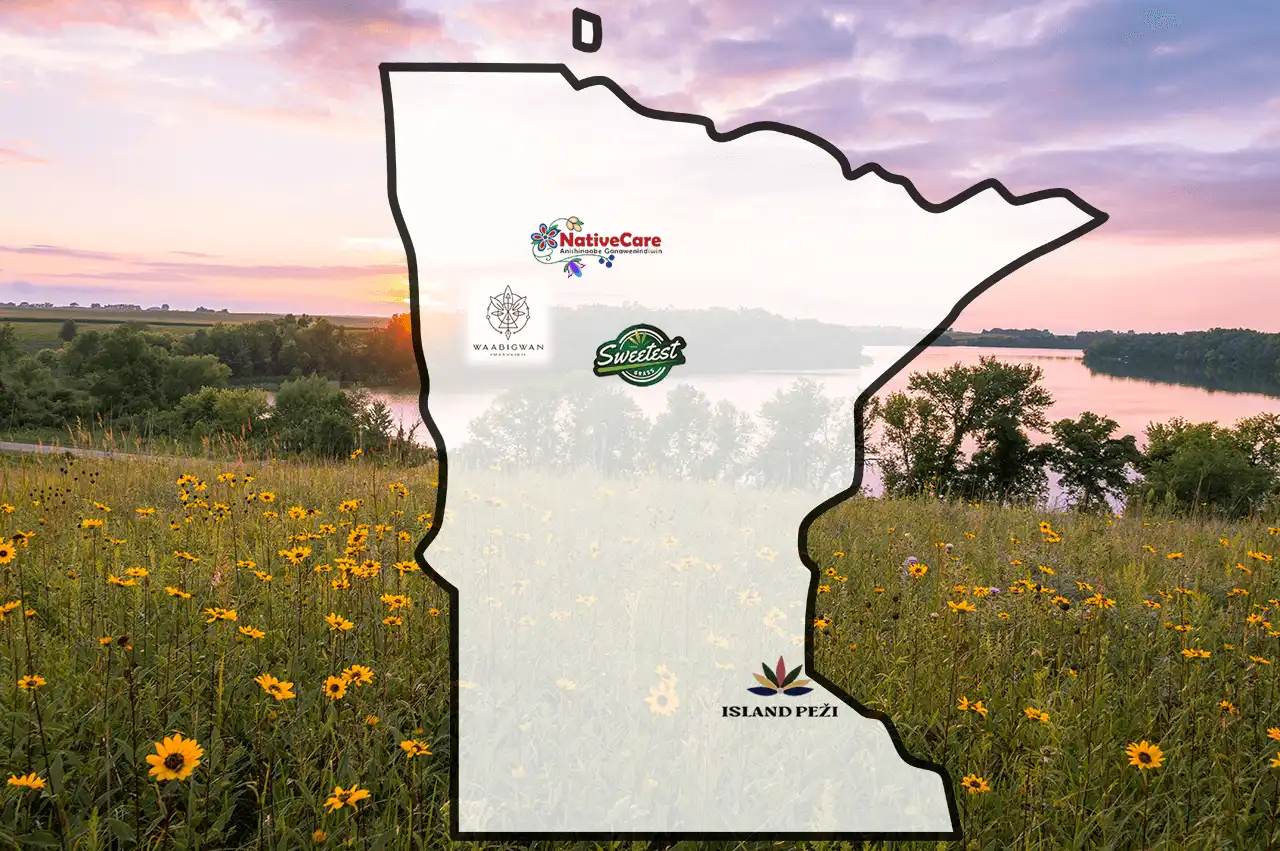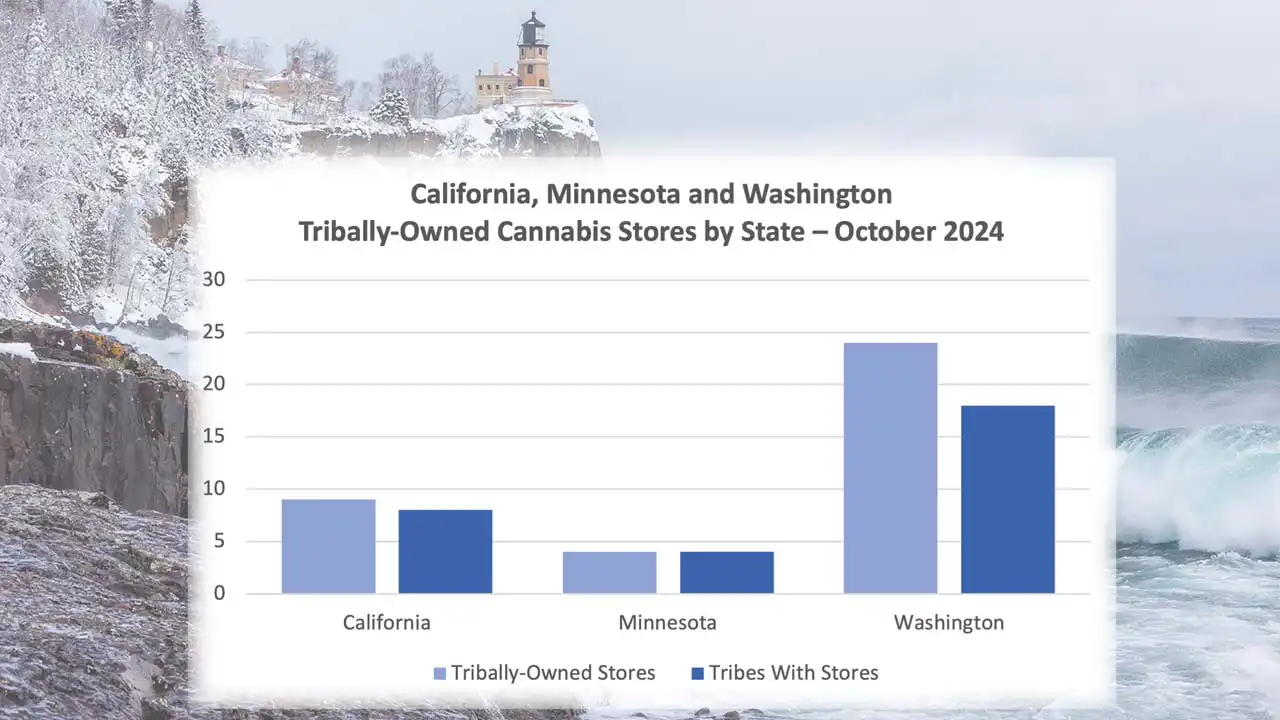Native American tribes bridge gap in Minnesota marijuana market
(MJBizDaily is publishing this guest column ahead of Indigenous Peoples Day on Monday. To be considered as an MJBizDaily guest columnist, please submit your request here.)
Native American cannabis businesses are helping to fill a major gap in supply while Minnesota prepares to launch its regulated adult-use market next year.
With state-licensed businesses unlikely to open until 2025, tribal nations in Minnesota are investing in marijuana, encouraged by promising demand and cooperative relationships with the state government.
Down the road, the tribes’ first-to-market advantage might give them an important foothold in what is expected to be a large adult-use industry.
Cannabis retail in Minnesota
On May 30, 2023, Gov. Tim Walz (now the Democratic Party’s vice presidential candidate) signed legislation that made Minnesota the 23rd state to legalize adult-use marijuana.
A few weeks later, the Red Lake Nation began welcoming customers to NativeCare, the first tribally owned recreational cannabis store to open in Minnesota since legalization.
Two days after NativeCare opened, White Earth Nation began recreational sales at Waabigwan Mashkiki, the cannabis store near their Shooting Star Casino in Mahnomen.
This past June, two more tribes entered the market: the Leech Lake Band of Ojibwe opened the Sweetest Grass next to their Northern Lights Casino, and the Prairie Island Indian Community opened Island Peži next to their Treasure Island Resort and Casino near the Minnesota-Wisconsin border.

Although recreational cannabis was legalized in Minnesota in 2023, the state licensing process is just getting started.
The first state-licensed businesses are not expected to open until 2025, giving Minnesota tribes an opportunity to supply a demand that is projected to reach $1.76 billion by 2029, according to the 2024 MJBiz Factbook.
State-tribe relations
Eleven federally recognized Native American tribal governments reside within the borders of Minnesota, and each has a separate relationship with the federal and state governments.
As sovereign nations with their own governments and regulatory powers, tribes across the country often implement their own cannabis laws, which sometimes differ from state statutes and regulations that are applicable off tribal lands.
However, Minnesota has made a strong, public effort to ensure that its state marijuana laws respect tribal sovereignty and operations.
State law enables the Minnesota governor to enter compacts with tribal governments.
These compacts are government-to-government agreements that address questions such as how interactions between tribal businesses and state-licensed businesses should be structured.
Minnesota is still in the process of negotiating compacts with the tribes.
One topic of negotiation is the possibility of tribes operating off-reservation cannabis businesses.
The White Earth Nation already laid the groundwork for opening an off-reservation cannabis store near the North Dakota border, having purchased a shuttered restaurant in Moorhead in May.
The tribe hopes to open a cannabis retail store on the property, subject to its negotiations with the state.
California comparison
Not all states have worked cooperatively on cannabis laws with Native American tribes.
California, for example, asks tribes to partially waive their sovereign immunity to participate in the state market – an understandably unpopular demand.
This policy is one of the reasons for the strikingly small number of tribally owned dispensaries in California.
Despite having the largest regulated cannabis market in the world, a population nearly seven times larger than Minnesota, a much older adult-use industry and more than 100 federally recognized tribes within its borders, California is home to only eight tribally owned marijuana stores.
Meanwhile, Minnesota tribes have announced plans for five more retail outlets, meaning the state could have more tribally owned marijuana stores than California by this time next year.
Washington state tribal cannabis
The state with the most tribally owned cannabis stores is Washington.
Like Minnesota, Washington law enables the state government to enter compacts with tribes.
Under Washington compacts, tribes have agreed to impose similar regulations and tax levels to those imposed by the state.
In return, compacting tribes in Washington state can purchase cannabis products from – or sell cannabis products to – state licensees.
Combined, 18 different tribes operate 24 tribally owned cannabis stores in Washington state – three times the number in California.

There are more tribes in Washington state than in Minnesota, and Washington’s recreational cannabis industry is 10 years older.
Although Minnesota is not likely to match Washington state’s number of tribally owned stores in the near future, Minnesota is well positioned to have continued tribal cannabis businesses growth.
This is good for the tribes, but it is also good for the state.
2024 MJBiz Factbook – now available!
Exclusive industry data and analysis to help you make informed business decisions and avoid costly missteps. All the facts, none of the hype.
Featured inside:
- Financial forecasts + capital investment trends
- 200+ pages and 49 charts highlighting key data figures and sales trends
- State-by-state guide to regulations, taxes & market opportunities
- Monthly and quarterly updates, with new data & insights
- And more!
Meeting cannabis demand
As the daunting process of marijuana business licensing continues, tribes can help meet the demand for cannabis in Minnesota.
While the state works to crack down on illegal cannabis sales before the launch of its adult-use market, tribes in Minnesota are providing safe, legal products.
Of course, once opened, some state-licensed businesses will be in direct competition with tribal retailers, and this could slow the growth of tribally owned cannabis retail.
But tribes could play a major role in supplying demand in Minnesota – even after state-licensed marijuana retailers begin to open.
For example, the Mille Lacs Band of Ojibwe is constructing a 50,000-square-foot cannabis cultivation facility as part of a seed-to-sale operation that is positioned to capitalize on high demand.
The facility will be significantly larger than any other state-licensed grow operations, which are capped at 30,000 square feet.
According to the Minnesota Post, government leaders expect tribes to be significant players in the state’s cannabis industry going forward.
So far, the data suggests they are right.
Matthew Klas is a senior associate with Minneapolis-based KlasRobinson Q.E.D., a national consulting firm specializing in economic development in Indian Country. He can be reached at mk***@kl*************.com.

